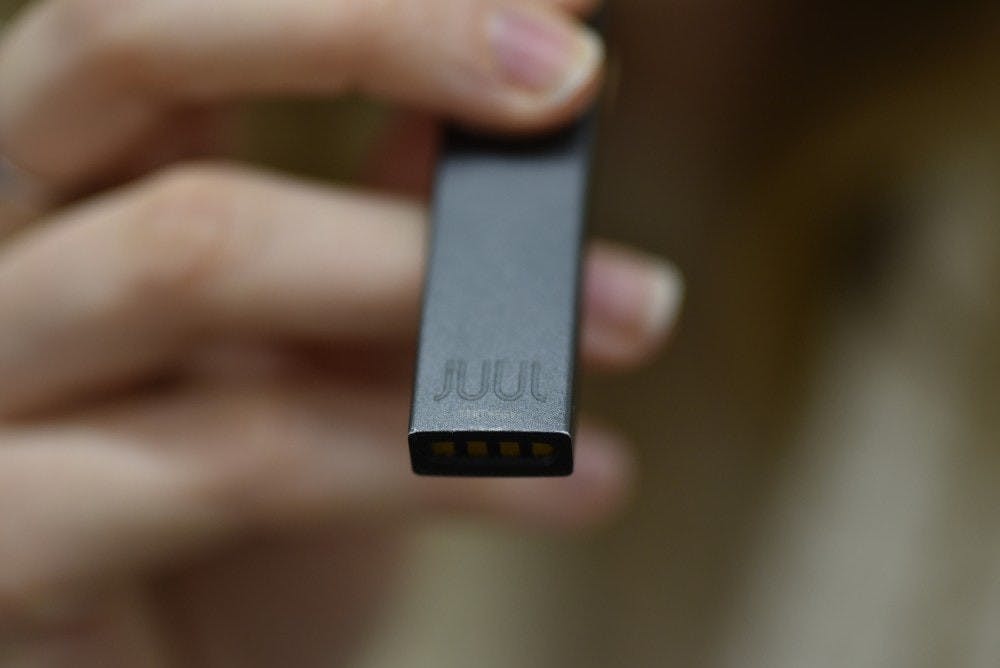From the cash crops of the early 17th century to packs of Marlboro cigarettes lining convenience store shelves today, tobacco has always been the backbone of the Virginian economy. Today, cigarettes are out and JUULs are in. JUULs are the latest form of electronic cigarettes, originally created to help smokers quit smoking. Shaped like a USB flash drive, JUULs appeal to youth with their slim appearance and abundance of flavor pods. These flavors range from tobacco to mint, capturing everything in between. The 2018 National Youth Tobacco Survey conducted by the Centers for Disease Control and Prevention found that 3.6 million high schoolers use some form of electronic cigarettes, such as JUUL. However, what many high school JUUL users do not know is a single JUUL pod contains as much nicotine as 20 cigarettes.
With Altria’s recent partial acquisition of JUUL, the Richmond-based tobacco giant announced its plans to curb teenage use of e-cigarettes. In the 2019 Virginia General Assembly session, Altria is backing a bill to raise to age to purchase tobacco products from 18 to 21. While this initially appears to be a progressive push by Altria, we should not be fooled. Raising the purchase age of tobacco to 21 puts the blame on the users, rather than the distributors of tobacco. It is in this way that HB 2748 fails to address the root cause of harm with tobacco use in minors.
The harmful effects of tobacco use are not new. The CDC cites cigarette smoke as the cause of one in five deaths per year in the United States. And the number of individuals in the U.S. who have died prematurely from cigarette use is 10 times the number of individuals who have died in all the wars fought by the U.S. In September 2018, The Food and Drug Administration issued the largest coordinated enforcement effort in the administration’s history against JUUL and other electronic cigarette companies.
This enforcement comes after JUUL and Altria failed to uphold promises they made to curb e-cigarette use among minors. While JUUL has altered its advertisements, discontinued popular pod flavors among youth and implemented age verification software on their website, the FDA alleges that this is not enough. JUUL and Altria must do more to curb the use of e-cigarettes among minors. For Altria, the answer to this mandate is to change the purchase age of tobacco products to 21.
Perhaps one of the reasons why HB 2748 has seen early success in the General Assembly is due to Altria’s political power in Richmond. Altria routinely lobbies members of the General Assembly from both sides of the aisle to advance legislation such as HB 2748. Before legislators even arrive in Richmond, Altira exercises their influence through campaign contributions. According to the Virginia Public Access Project, in 2018 Altria donated $327,597 to political campaigns, political action committees and candidates of both parties in Virginia alone. Through lobbying and campaign finance, Altria is able to extend their influence deep into Virginia politics. Therefore, it should come as no surprise that HB 2748 is supported by both Democrats and Republicans.
Despite this, both parties in the Virginia General Assembly should consider the dangers that tobacco use poses not only for minors, but individuals of all ages when drafting legislation. Although HB 2748 presents a positive step in in the effort to curb tobacco use in the Commonwealth, it is unclear what raising the purchasing age for tobacco to 21 will actually achieve. JUULs and other tobacco products will certainly find their way into the hands of minors regardless of age restrictions. Despite Virginia’s legal barriers, minors are still managing to buy JUULs under the table.
While HB 2748 is well intentioned, it is clear that the purchasing age for tobacco is not the cause of the increasing rate of e-cigarette use among minors. With the sensational marketing tactics and “hip” design, e-cigarettes are constructed to appeal to youth. Early addiction to nicotine could lead to cigarette use down the line, which causes lifelong problems, including an increased risk for lung cancer and a lower life expectancy.
Legislation should be tailored to raising awareness of the adverse health effects of nicotine use, especially among minors. Moreover, additional public health measures — such as educational programs to inform young people of the dangers of e-cigarette use and nicotine addiction — must be taken to change the cultural appeal these products, and to further deter minors from using these products. Considering that raising the purchase age does nothing to curb the dangerous effects of nicotine, it is evident that Altira-backed HB 2748 merely places a band-aid over the nicotine epidemic plaguing youth in America.
Mary Alice Kukoski is an Opinion Columnist for The Cavalier Daily. She can be reached at opinion@cavalierdaily.com.







